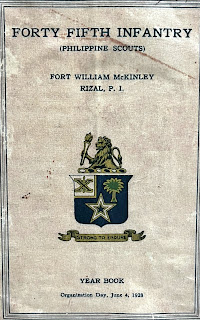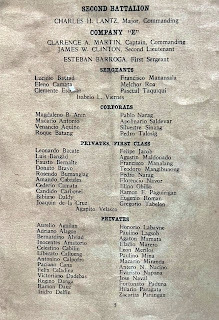By Maj. William Carraway, historian, Georgia National Guard
Major
Alejandro V. Pascual IV was promoted to lieutenant colonel during a ceremony at
the Clay National Guard Center in Marietta, Ga. May 21, 2023. The ceremony also
provided the opportunity to honor the Pascual family’s history of military
service as Maj. Gen. Tom Carden, Georgia’s Adjutant General, presented medals
earned by Pascual’s great grandfather, Technical Sgt. Isabelo Viernes of the 45th
Infantry Regiment (Philippine Scouts), to Pascual’s family.
“Today is
certainly a special day for our organization and for our great nation,” said Carden
in his remarks before the medal presentation. “I can’t tell you how humbled I
am to be in the room with a family with servicemen with such an inspiring
legacy that we can learn from. Lieutenant Colonel Pascual’s desire to share the
spotlight with his grandfather, Sgt. Isabelo Viernes, on such a special day is
emblematic of our shared values as an organization.”
Joining
Carden in offering congratulations to Pascual and his family were Col. Jean
Paul Laurenceau, commander of the 201st Regional Support Group; Brigadier
General Bobby Christine, special assistant to the director of the Army National
Guard who also assisted Pascual’s family during the pinning ceremony; and Col.
Brian Bischoff, state judge advocate for the Georgia National Guard who administered
the oath of office to Pascual. But it was Pascual himself who riveted the
audience with the story of how his journey of military service was inspired by
learning the story of his great grandfather’s experiences in the 45th Infantry
Regiment.
 |
| 45th Infantry Regiment History. Courtesy of Lt. Col. Alejandro Pascual IV. |
The 45th Regiment was organized in the United States in 1917 and sailed to the Philippines in December 1920. In 1942, the 45th defended the Philippines against relentless Japanese assaults earning three Distinguished Unit Citations and a Philippine Presidential Unit Citation for actions on the Bataan Peninsula. Soldiers of the regiment were decorated for valor earning a Medal of Honor, six Distinguished Service Crosses, 27 Silver Star Medals. Viernes was one of 11 Soldiers of the 45th to earn the Bronze Star Medal.
Growing up,
Pascual had heard stories of Viernes military service, but it was not
until he embarked on a history project in high school that he learned the full
story of his ancestor’s service in World War II from his grandmother.
Viernes
fought with distinction at the Battle of the Pockets and the Battle of the
Points while enduring limited rations for more than three months. His regiment,
and the defenders of the Philippines, fought valiantly despite overwhelming
odds. Major General Edward King, overall commander of forces on Bataan
surrendered on April 9, 1942 only after all hope of effective resistance was
gone. Viernes and what remained of King’s 78,000 man force would endure a
forced march of more than 65 miles to captivity which came to be known as the
Bataan Death March.
Pascual
pursued a bachelor’s degree in history from Furman University enroute to
receiving his Juris Doctorate from Samford University. Pascual’s studies in
history further nursed his interest in his family’s experience in World War II.
He discovered that his grandmother’s memories were not only borne out by
military service records but that his great grandfather had never received some
of the medals he earned in the conflict.
 |
| Roster of Company E, 45th Infantry Regiment. Isabelo Viernes is listed with the sergeants. Courtesy of Lt. Col. Alejandro Pascual IV. |
never physically received (his Bronze Star Medal and Prisoner of War Medal) because the regulation change that made him eligible was after the war and the(Prisoner of War) Medal wasn't even created until after he died.”
Pascual did
not learn the full story of Viernes’ service until recently when he received
more than 400 pages of records from the National Archives. The records revealed
that Viernes had entered service in 1914, a fact previously unknown by Pascual
and his family, and had earned the World War I Victory Medal. Surviving both
world wars and the horrific effects of the Death March, Viernes retired in 1947
with full veteran benefits and received US citizenship.
Pascual had
initially planned to commemorate Viernes’ service in his remarks during his
promotion ceremony, but after learning the full extent of his service record,
he approached his chain of command about the possibility of conducting a medal
presentation in conjunction with his promotion, a proposal which was met with
enthusiastic support from the Georgia National Guard.
Pascual
began his military career in 2012 with the Georgia National Guard and was
assigned as a defense counsel with the 1078th Trial Defense Service. In 2014 he
mobilized to Kuwait where he served as an international and operational law
attorney. During the deployment, US Army Central Command became the
headquarters of Combined Joint Task Force Operation Inherent Resolve whereupon
Pascual provided counsel on rules of engagement for operations in Iraq and
Syria. Returning to the United States the following year, Pascual was assigned
as trial counsel for the 560th Brigade Support Battalion. With the inactivation
of the 560th BFSB in 2016, transferred to the 648th Maneuver Enhancement
Brigade and was subsequently assigned to the 78th Troop Command to serve as the
brigade’s command judge advocate. He is currently the command judge advocate
for the 201st Regional Support Group and serves as the deputy chief assistant
district attorney for the District attorney’s office, Columbia Judicial Circuit
of Georgia.
While the
ceremony provided the opportunity to recognize generations of service, Pascual
was humble about his part, preferring to recognize Viernes’ service over his
own.
“I would
probably have kept (the ceremony) small, said Pascual, “but I did want to honor
my great grandfather and figured this was a chance to meaningfully do it in a
way that was personal, and also recognize my heritage and that I am part of a
greater legacy of Filipinos serving in the US armed forces.”


























.jpg)




